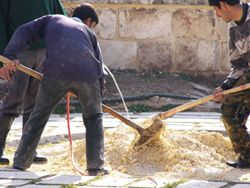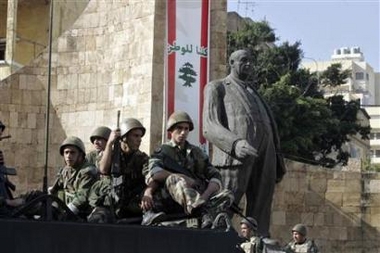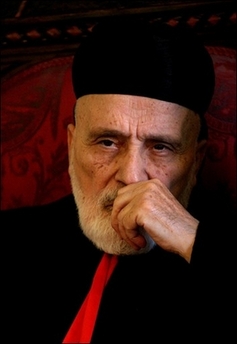BEIRUT (AFP) – The Lebanese army on Thursday banned civilians from wearing military-style clothing amid fears of unrest in the country facing …
 BEIRUT, 3 December 2007 (IRIN) - Radwan was fast asleep when three men broke down the door of his flat. They beat him. They broke one of his ribs. Then two held his arms while the third slashed his head with a knuckleduster. His crime, they told him, was to be a Syrian working in Lebanon.
BEIRUT, 3 December 2007 (IRIN) - Radwan was fast asleep when three men broke down the door of his flat. They beat him. They broke one of his ribs. Then two held his arms while the third slashed his head with a knuckleduster. His crime, they told him, was to be a Syrian working in Lebanon.
After Radwan - who like all Syrians interviewed by IRIN gave a false name for fear of retribution - went to the police, the thugs came back.
 Last Christmas, the Maronite Patriarch Mar Nasrallah Boutros Sfeir told Lebanese Christians, "Do not be afraid." At first glance, the Lebanese did not seem afraid, not a bit. Despite all the turmoil they were going through, they still managed to put up their Christmas trees, go to nightclubs, dine at fancy restaurants and attend Fayruz. At second glance, however, the Lebanese had every reason to be afraid back then, and even more so today, one year later. Lebanon continues to suffer from the Israeli war in 2006, and the continued assassinations that have badly hit Lebanon's economy -- and tourism -- since 2005 Then came the massive sit-in starting 2 December 2006 which at the time of writing, continues, with the aim of bringing down the cabinet of Prime Minister Fouad Al-Siniora. Now comes vacancy at the Presidential Palace.
Last Christmas, the Maronite Patriarch Mar Nasrallah Boutros Sfeir told Lebanese Christians, "Do not be afraid." At first glance, the Lebanese did not seem afraid, not a bit. Despite all the turmoil they were going through, they still managed to put up their Christmas trees, go to nightclubs, dine at fancy restaurants and attend Fayruz. At second glance, however, the Lebanese had every reason to be afraid back then, and even more so today, one year later. Lebanon continues to suffer from the Israeli war in 2006, and the continued assassinations that have badly hit Lebanon's economy -- and tourism -- since 2005 Then came the massive sit-in starting 2 December 2006 which at the time of writing, continues, with the aim of bringing down the cabinet of Prime Minister Fouad Al-Siniora. Now comes vacancy at the Presidential Palace.
On 23-24 November 2007, Beirut seemed divided between those rejoicing at the exodus of President Emile Lahoud and those paying homage to a man whom they considered a great struggler. Lahoud left a vacant post at Baabda Palace. After weeks of negotiations, the Lebanese were unable to agree on a replacement. Neighbourhoods loyal to parliamentary majority leader Saad Al-Hariri celebrated with fireworks and young people dancing in the street.Syrian television aired a special documentary about him, saying that he was the man who helped unite Lebanon, in his capacity as army commander, in the 1990s. He helped liberate South Lebanon in 2000, and prevented Lebanon from becoming a satellite state of the United States and Israel. Other strong examples are Maronite chief Suleiman Franjiyeh, former prime ministers Omar Karameh and Najib Mikati, parliament speaker Berri, and Hizbullah leader Hassan Nasrallah. All of them upheld Lahoud as a constitutional president, after the Syrians departed in April 2005.
 01 December 2007BEIRUT: Maronite Patriarch Nasrallah Butros Sfeir urged the opposition to end its boycott of the presidential election and elect a successor to former President Emile Lahoud. He warned the vote must be held "before it's too late.""The present situation is dangerous and we wonder if any of those in charge, and those who avoid going to Parliament when an electoral session is called, appreciate the seriousness of the situation," Sfeir said in a statement issued Friday.
01 December 2007BEIRUT: Maronite Patriarch Nasrallah Butros Sfeir urged the opposition to end its boycott of the presidential election and elect a successor to former President Emile Lahoud. He warned the vote must be held "before it's too late.""The present situation is dangerous and we wonder if any of those in charge, and those who avoid going to Parliament when an electoral session is called, appreciate the seriousness of the situation," Sfeir said in a statement issued Friday.
Sfeir said those who have closed Parliament "bear a huge responsibility," in clear reference to Speaker Nabih Berri, pointing to Parliament as "the natural place for MPs to gather to discuss national issues and take the necessary decisions." Sfeir further chided the opposition's resigned Cabinet ministers who boycott Cabinet sessions while continuing to run their respective ministries."The Lebanese people are sick of these acts that contradict reason and law, and they wait for their representatives whom they elected to focus on people's daily concerns, provide jobs for people so they can take care of their families and provide them a secure and dignified life," Sfeir said.
Sfeir said politicians' commitment to one foreign power or another has made them all prisoners of their fixed positions and has paralyzed their capabilities. Quoting the late former US President John F. Kennedy, Sfeir said "do not ask what your country can do for you, ask what you can do for your country."
"No one can ask of their country security, stability and peace as long as they do not give their country what it asks of them, absolute loyalty and sacrifice. What is required now is electing a president before it's too late," Sfeir said, adding that all MPs are responsible to ensure such an election takes place.
Sfeir, pressured into drafting a list of suitable candidates for the presidency, expressed frustration that political opponents could not agree on a candidate from his list which he reluctantly produced following pressure from France. Lebanese Armed Forces head General Michel Suleiman's name has emerged as a suitable presidential candidate, a name that was not on the patriarch's list.
Khazen History


Historical Feature:
Churches and Monasteries of the Khazen family

St. Anthony of Padua Church in Ballouneh
Mar Abda Church in Bakaatit Kanaan
Saint Michael Church in Bkaatouta
Saint Therese Church in Qolayaat
Saint Simeon Stylites (مار سمعان العامودي) Church In Ajaltoun
Virgin Mary Church (سيدة المعونات) in Sheilé
Assumption of Mary Church in Ballouneh
1 - The sword of the Maronite Prince
2 - LES KHAZEN CONSULS DE FRANCE
3 - LES MARONITES & LES KHAZEN
4 - LES MAAN & LES KHAZEN
5 - ORIGINE DE LA FAMILLE
Population Movements to Keserwan - The Khazens and The Maans
ما جاء عن الثورة في المقاطعة الكسروانية
ثورة أهالي كسروان على المشايخ الخوازنة وأسبابها
Origins of the "Prince of Maronite" Title
Growing diversity: the Khazin sheiks and the clergy in the first decades of the 18th century
Historical Members:
Barbar Beik El Khazen [English]
Patriach Toubia Kaiss El Khazen(Biography & Life Part1 Part2) (Arabic)
Patriach Youssef Dargham El Khazen (Cont'd)
Cheikh Bishara Jafal El Khazen
Patriarch Youssef Raji El Khazen
The Martyrs Cheikh Philippe & Cheikh Farid El Khazen
Cheikh Nawfal El Khazen (Consul De France)
Cheikh Hossun El Khazen (Consul De France)
Cheikh Abou-Nawfal El Khazen (Consul De France)
Cheikh Francis Abee Nader & his son Yousef
Cheikh Abou-Kanso El Khazen (Consul De France)
Cheikh Abou Nader El Khazen
Cheikh Chafic El Khazen
Cheikh Keserwan El Khazen
Cheikh Serhal El Khazen [English]
Cheikh Rafiq El Khazen [English]
Cheikh Hanna El Khazen
Cheikha Arzi El Khazen
Marie El Khazen